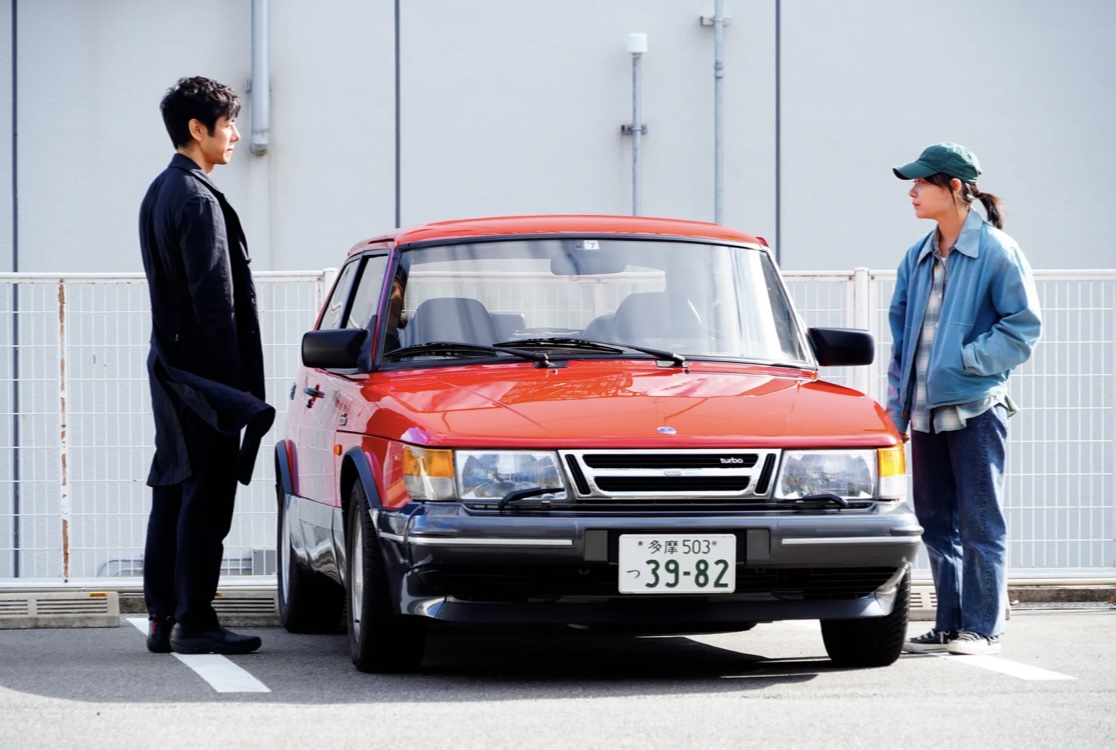What a blessing this time of year! For the fans of fast paced explosions and quips, Spider-Man No Way Home is her to give that to you. If you’re a quiet contemplative type of person, Drive My Car is here to sedately get from work to home and back again. Though the “action” sequences involve a light car crash, Ryusuke Hamaguchi’s beautifully written story focuses on internal action, and how a benign exterior can hide a wealth of feelings and emotions underneath commuting in an old red Saab mini sedan.
Through a lengthy chunk of the movie pre credits, we are introduced to Yusuke (Hidetoshi Nishijima) and his wife Oto (Reika Kirishima), both professional artists. Still recovering from a past trauma, the pair have found a lifestyle that works for them day to day. Fast forward a few years, and Yusuke, now alone, travels to Hiroshima to direct an adaptation of Anton Chekhov’s Uncle Vanya. Driven to/from work daily by the theater’s trusted driver Misaki (Toko Miura), Yusuke works with the cast, including lead Koji (Masaki Okada), to make Uncle Vanya a success, despite Yusuke’s complicated past experiences acting in the play.
The big easy line critics have been using about Drive My Car is that these people are always moving but going nowhere. While that title is great for clicks, it disservices the brilliance of Ryusuke Hamaguchi’s screenplay uncovers. The strange opening hour establishes Yusuke and Oto’s relationship patterns. Some stuff is boring predictable relationship activity, but other quirks are either creepy or heartbreaking, and as you learn, are part of a day to day living Yusuke and Oto decided together to engage in or face more traumatic consequences as change has usually brought pain and anguish to each person. Hamaguchi’s story reveals layers upon layers of coping mechanisms that have been built by the couple to keep their relationship going, showcasing the different ways love can manifest over the course of a long term relationship: physically and emotionally evolving as the couple does or actively tries not to risk emotional calamity.
But Oto leaves the story an hour in, forcing Yusuke to drastically lean into his work life so as to keep his emotional stability in neutral. This makes it hard for him to open up acting, so he opts for a directing gig for Chekhov’s Uncle Vanya, which he’s excelled acting in before. As Yusuke auditions, works with, and watches his cast perform, he has to navigate in the complicated nature of acting with the young, unproven thespians in front of him. Those conversations reveal writer/director Hamaguchi’s depth and understanding of the tenants of human condition. Let’s start with connection: how people choose to show their love and connect with one another is entirely different relationship to relationship. Misaki, for example, shows her love and affection through her driving skills, making the rider as comfortable as possible since circumstances which the plot reveal make it difficult for her to showcase her true feelings directly. That is Hamaguchi’s 2nd point: that each person will have some emotionally traumatic event in their life, and build barriers around themselves as coping mechanisms. Some people lean hard into work, others cut ties with the things that caused them that pain. As we continue driving around, Hamaguchi digs even deeper, and shows that over time, if you take the time to establish those connections built upon understanding and trust, confronting your past pains are not as scary, and you can get to that emotional catharsis you always want, accepting who you really are so you can move forward; not all change is bad. Sometimes sadly, that real person underneath is volatile or maybe dangerous which clearly Yusuke is scared of, but as Hamaguchi teaches us, if you take the time to really care for and understand others, you’ll probably find that those fears and traumas do not just have to be coped with, they can be overcome.
What a glorious complicated emotional mess Drive My Car is. You’ll definitely not be totally comfortable watching Ryusuke Hamaguchi’s Saab travels, but by the end the keenly observed and felt story will stay with you long after it ends. To be satisfied by layers of human dissatisfaction is something only a truly great tale can pull off, so kudos to Hamaguchi, Hidetoshi Nishijima, for touching my heart, so much so that I have to buy a red Saab to be driven around in for hours now. Anyone know any good drivers I can talk to?

